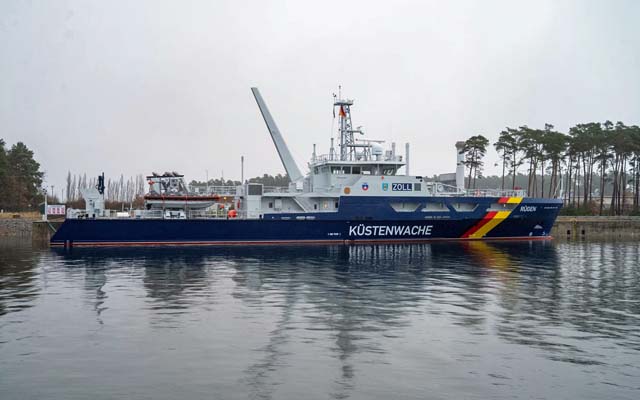The German Customs Service has commissioned a new customs vessel ‘Rügen’, the largest vessel in the its fleet, which is equipped with six mtu gas engines from Rolls-Royce, four providing propulsion and two more for onboard power.
German Customs Directorate President Dr Armin Rolfink, said: “With the commissioning of the Rügen, we are setting an important milestone for the strengthening and sustainable modernisation of our customs fleet. This state-of-the-art customs vessel combines high performance with innovative and environmentally friendly technology, enabling us to carry out our important customs duties at sea even more efficiently in the future.”
Rolls-Royce is currently equipping four new German customs vessels with a total of 15 mtu gas engines, which provide propulsion and, in some cases, onboard power. As part of a modernisation programme, they complement the customs fleet in the North and Baltic Seas, which largely relies on mtu power. The advantages of the mtu gas engines include their low exhaust and noise emissions and their dynamic performance. Rolls-Royce ensures the reliable operation of the customs fleet’s eleven vessels powered by mtu engines through a long-term service contract .
The new 67m customs vessel Rügen, designed for deployments at sea lasting several weeks, was built at the Fassmer shipyard in Berne, northern Germany. It is powered by four 16-cylinder mtu Series 4000 gas engines and two controllable-pitch propellers. Combined with electric motors and two onboard power generators (also 16V4000 mtu gas engines), the vessel can be operated in various modes as needed: purely gas-electric, purely gas-mechanical, and booster mode. In booster mode, all four main engines, each with an output of 1,492 kW, and the electric motors, which receive power from the onboard generators, propel the Rügen to a speed of 23 knots.
Three additional 55m customs vessels are currently being built by the Peene shipyard in Wolgast, northern Germany, which is part of the NVL shipyard group. Each is equipped with three 16-cylinder mtu Series 4000 gas engines, each driving a FP propeller. To achieve a speed of about 26 knots, their power has been increased by 10% to 1,641 kW each.
Denise Kurtulus, SVP Global Marine, Rolls-Royce Power Systems, said: “We congratulate the German Customs Service on the commissioning of its new operational vessel Rügen and the three other new vessels. Reliability, ease of operation, dynamic engine performance, and low emission levels of the propulsion systems play a key role in the responsible tasks of the coast guard. These advantages of mtu gas engines will help us further expand our market share in our strategic marine business area.”
Even without exhaust aftertreatment, mtu gas engines significantly exceed the limits of current emissions regulations (such as IMO tier III). Particulate matter is below the detection limit , and they emit only low levels of NOx. Thanks to the double-walled design of the gas system, the engine room can be designed similarly to that of a diesel engine. mtu gas engines already power tugboats and ferries in Europe and Asia. Ferry operators such as the Doeksen shipping company in the Netherlands particularly appreciate the quietness, low vibration, no unpleasant odour, and no black smoke generated by mtu gas engines. The Konstanz municipal utility company has been operating its newest Lake Constance ferry with mtu gas engines in a climate-neutral manner using biogas since July 2024. The first hybrid tugboat powered by LNG from the Sembcorp Marine Integrated Yard in Singapore also has two mtu gas engines on board.
Image: ‘Rugen’, mtu gas engine powered vessel for German Customs (source: Rolls-Royce Power Systems)



